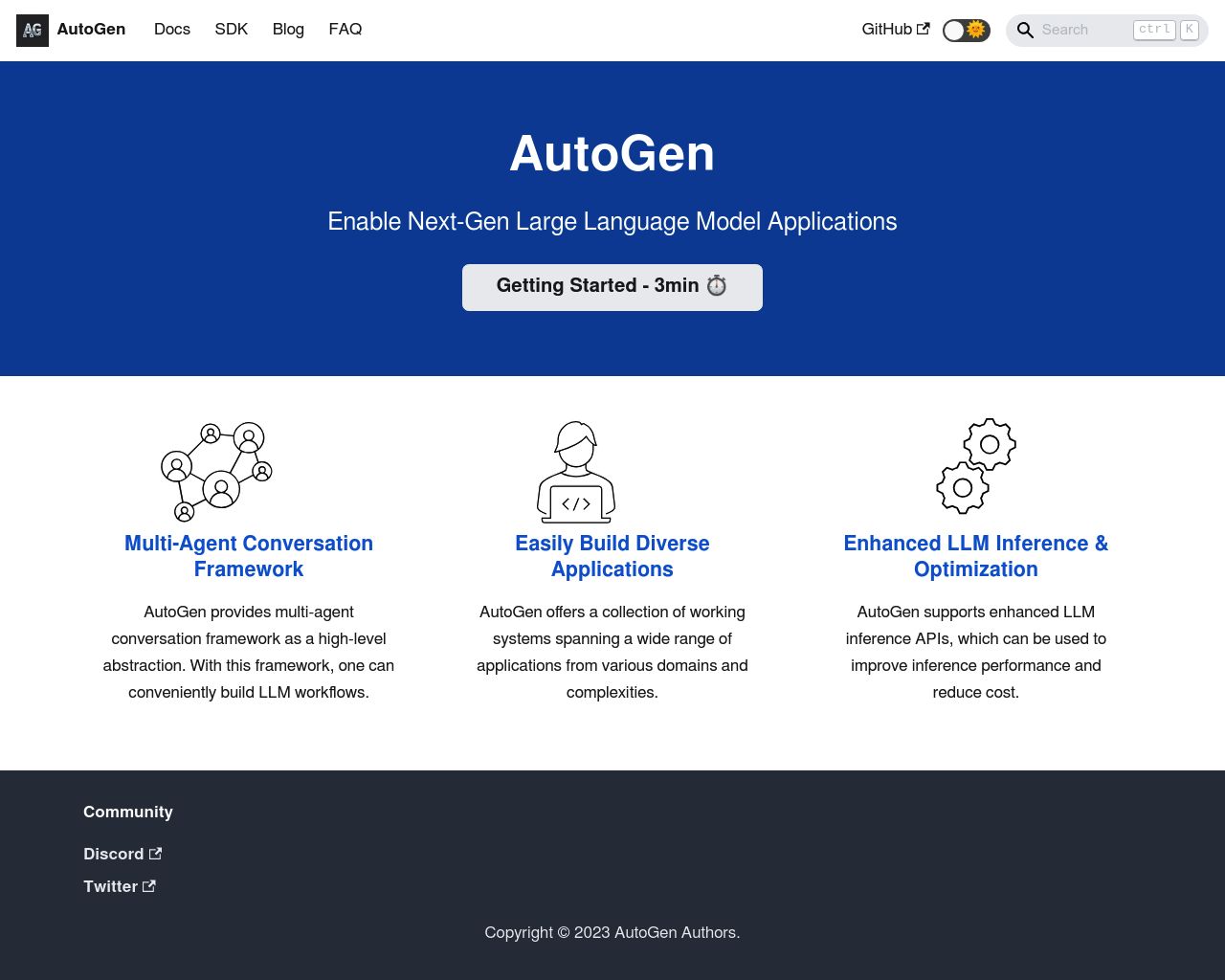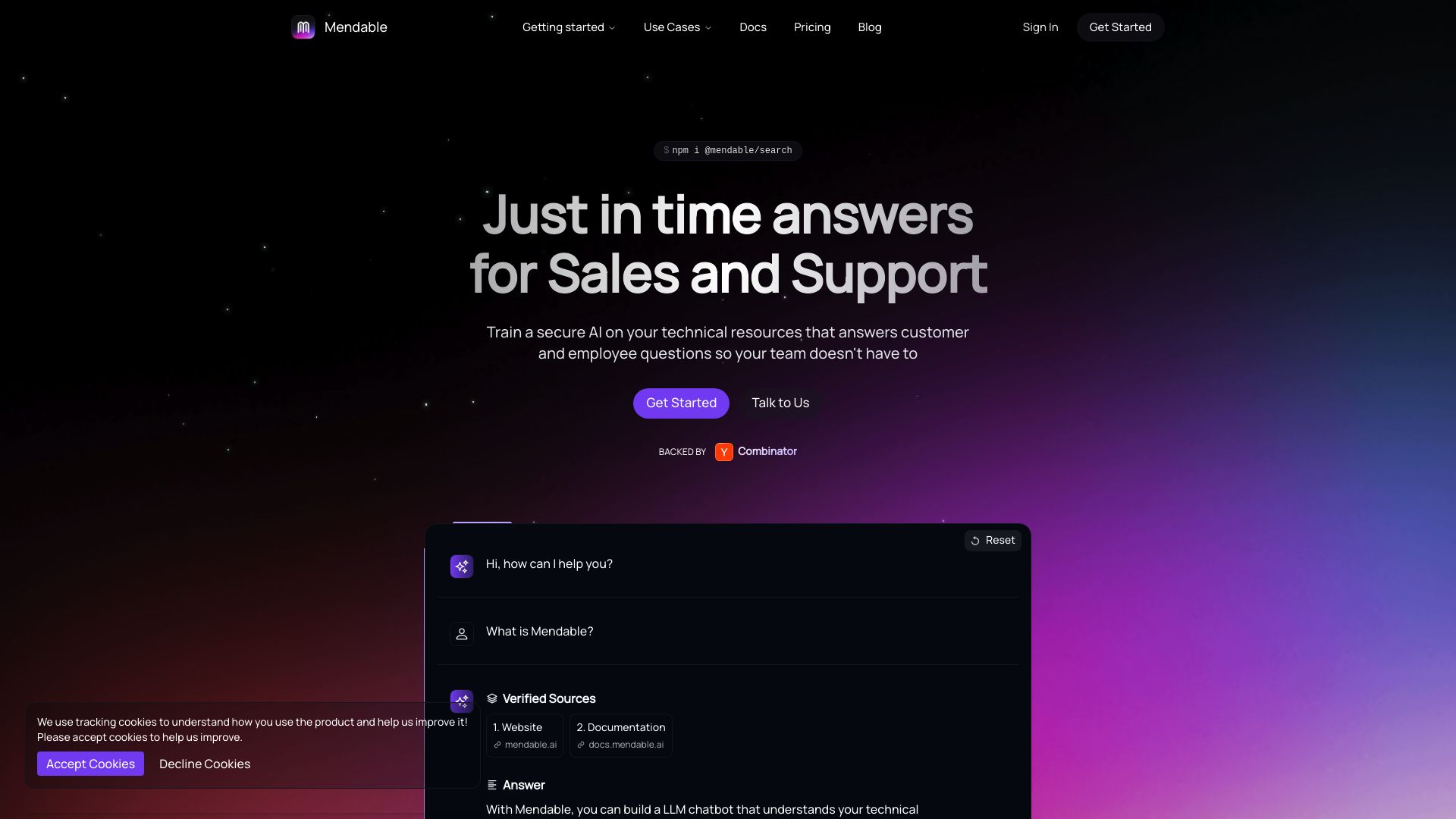AutoGen vs. Mendable: Comparing AI Agent Platforms
AI-powered agent development platforms are reshaping how businesses interact with technology, automate processes, and enhance customer experiences. This comparison delves into three leading solutions: AutoGen vs. Mendable, and SmythOS. AutoGen offers a sophisticated framework for multi-agent conversations, while Mendable focuses on chat-powered search components. SmythOS emerges as a comprehensive platform, combining user-friendly design with powerful AI capabilities.
We’ll explore how each platform addresses key challenges in AI implementation, from technical integration to scalability and security. Whether you’re a developer seeking advanced AI tools, a business leader looking to streamline operations, or an entrepreneur exploring AI’s potential, this analysis will guide you through the strengths and limitations of each platform, helping you make an informed decision for your AI journey.
AutoGen Overview
AutoGen empowers developers to build sophisticated AI applications through multi-agent conversations. This open-source framework enables the creation of customizable agents that interact with each other, Large Language Models (LLMs), tools, and humans to tackle complex tasks.


AutoGen’s core strength lies in its multi-agent conversation system. These agents collaborate autonomously or with human input, adapting to various use cases. The framework maximizes LLM performance through enhanced inference capabilities, including tuning, caching, error handling, and templating. This optimization is crucial for leveraging expensive LLMs effectively.
AutoGen empowers developers to build sophisticated AI applications through multi-agent conversations… enabling the creation of customizable agents that interact with each other, Large Language Models (LLMs), tools, and humans…
Developers can tailor agents to specific tasks, integrating LLMs, human inputs, and tools. AutoGen supports both fully autonomous operations and human-in-the-loop problem-solving, offering flexibility for applications requiring human oversight. The framework has proven effective in diverse applications, from automated task solving and code generation to continual learning and complex problem-solving in group chats.
For developers, AutoGen provides essential debugging tools and logging functionalities for API calls, facilitating the diagnosis and optimization of LLM-based systems. The inclusion of EcoOptiGen, a cost-effective technique for tuning large language models, underscores AutoGen’s commitment to enhancing LLM efficiency and effectiveness.
While AutoGen offers powerful capabilities, it lacks a visual builder or no-code editor, which may present a steeper learning curve for non-technical users. Additionally, the framework doesn’t provide built-in features for data encryption or IP control, potentially requiring additional measures for enterprise-level security and compliance.
Mendable Overview
Mendable offers chat-powered search components that deliver accurate, contextual answers to customer queries based on existing documentation. These components integrate seamlessly into applications through Mendable’s API or platform-specific modules for React, Vanilla JS, and Docusaurus.
Mendable’s suite includes versatile components like the Search Bar, Floating Button, InPlace Component, and Chat Bubble. Each serves distinct use cases, enhancing user engagement across websites and applications. The platform’s strength lies in its customization capabilities, allowing users to fine-tune AI responses with template-based prompts and dynamic variables.
Mendable’s suite includes versatile components like the Search Bar, Floating Button, InPlace Component, and Chat Bubble. Each serves distinct use cases, enhancing user engagement across websites and applications.
Data management features stand out, with auto-syncing capabilities ensuring up-to-date information from various sources like websites, GitHub, Notion, and Zendesk. Mendable’s metadata filtering provides granular control over information sources, enhancing response accuracy. For developers, the robust API and SDKs (including Python) enable advanced customization and integration, supporting complex use cases and automation needs.


Mendable’s Product Copilots feature tailors components to provide context-aware answers within specific applications, enhancing user support. The platform’s integration with popular services like Slack, Discord, and WordPress extends its versatility across diverse environments. This comprehensive approach positions Mendable as a powerful tool for businesses seeking to enhance their information retrieval and customer support systems.
Mendable’s Product Copilots feature tailors components to provide context-aware answers within specific applications, enhancing user support.
Despite its strengths, Mendable faces challenges in a competitive market. The platform lacks a visual builder or no-code editor, potentially limiting accessibility for non-technical users. Additionally, while it offers robust API support, the absence of features like agent work scheduling or a hosted vector database might constrain some advanced use cases. These limitations could impact Mendable’s appeal to users seeking more comprehensive AI agent development environments.
Feature Comparison
AutoGen and Mendable offer distinct approaches to AI agent development, with notable differences in their core components and security features. AutoGen excels in multi-agent collaboration, providing a framework for creating customizable agents that can interact autonomously or with human input. Its strength lies in enhanced Large Language Model inference capabilities, including tuning, caching, and error handling. AutoGen supports persistent threads for memory and context management, enabling sophisticated problem-solving through agent conversations.
Mendable, on the other hand, focuses on delivering chat-powered search components for accurate, contextual answers based on existing documentation. While it lacks AutoGen’s multi-agent capabilities, Mendable shines in data management with auto-syncing features and metadata filtering for precise control over information sources. Mendable’s component-based approach, including search bars and chat bubbles, allows for easier integration into various platforms.
In terms of security, both platforms have gaps. AutoGen does not explicitly mention data encryption or IP control features, potentially requiring additional measures for enterprise-level security. Mendable’s documentation also lacks specific details on these security aspects. However, Mendable offers OAuth support for API authentication, providing a layer of security for integrations. Neither platform appears to offer comprehensive built-in security features, which may be a consideration for users with stringent data protection requirements.
Feature Comparison Table
| AutoGen | Mendable | SmythOS | |
|---|---|---|---|
| CORE FEATURES | |||
| Hosted Agents (Dev, Production) | ✅ | ❌ | ✅ |
| Environments (Dev, Production) | ✅ | ❌ | ✅ |
| Visual Builder | ❌ | ❌ | ✅ |
| No-Code Options | ❌ | ❌ | ✅ |
| Autonomous Agents | ✅ | ❌ | ✅ |
| Debug Tools | ✅ | ❌ | ✅ |
| Multimodal | ✅ | ❌ | ✅ |
| Multi-Agent Collaboration | ✅ | ❌ | ✅ |
| Work as Team | ✅ | ❌ | ✅ |
| Agent Work Scheduler | ❌ | ❌ | ✅ |
| SECURITY | |||
| Constrained Alignment | ❌ | ❌ | ✅ |
| IP Control | ❌ | ❌ | ✅ |
| COMPONENTS | |||
| Foundation AIs | ✅ | ❌ | ✅ |
| Huggingface AIs | ✅ | ❌ | ✅ |
| Zapier APIs | ✅ | ❌ | ✅ |
| Classifiers | ✅ | ❌ | ✅ |
| Logic | ✅ | ❌ | ✅ |
| Data Lakes | ❌ | ❌ | ✅ |
| DEPLOYMENT OPTIONS (EMBODIMENTS) | |||
| Deploy as Webhook | ✅ | ❌ | ✅ |
| Staging Domains | ❌ | ❌ | ✅ |
| Production Domains | ❌ | ❌ | ✅ |
| Deploy as Scheduled Agent | ❌ | ❌ | ✅ |
| Deploy as GPT | ✅ | ❌ | ✅ |
| DATA LAKE SUPPORT | |||
| Hosted Vector Database | ❌ | ❌ | ✅ |
| Sitemap Crawler | ❌ | ❌ | ✅ |
| YouTube Transcript Crawler | ❌ | ❌ | ✅ |
| URL Crawler | ✅ | ❌ | ✅ |
Best Alternative to AutoGen and Mendable
SmythOS stands out as a superior alternative to AutoGen and Mendable, offering a comprehensive platform for AI agent development and deployment. We’ve designed SmythOS to address the limitations of other platforms while providing unparalleled ease of use, an extensive feature set, and support for unlimited use cases.
Our drag-and-drop visual builder sets SmythOS apart, allowing users to create sophisticated AI workflows without extensive coding knowledge. This intuitive interface democratizes AI development, making it accessible to both technical and non-technical users alike. Unlike AutoGen and Mendable, SmythOS combines the power of advanced AI capabilities with user-friendly design, enabling rapid prototyping and deployment of AI agents.
Our drag-and-drop visual builder sets SmythOS apart, allowing users to create sophisticated AI workflows without extensive coding knowledge.
SmythOS excels in its versatility, supporting a wide range of AI models and integrations. While AutoGen focuses on multi-agent collaboration and Mendable specializes in chat-powered search, SmythOS offers a holistic approach to AI agent development. Our platform seamlessly integrates with various foundation models, APIs, and data sources, allowing users to create AI solutions tailored to their specific needs. This flexibility ensures that SmythOS can adapt to diverse industries and use cases, from customer service chatbots to complex data analysis tools.
Scalability and enterprise-grade features further distinguish SmythOS from its competitors. We’ve built our platform with robust security measures, including data encryption and IP control, addressing the gaps present in AutoGen and Mendable. SmythOS also offers advanced deployment options, allowing users to deploy agents as APIs, webhooks, or scheduled tasks. This level of control and scalability makes SmythOS ideal for businesses of all sizes, from startups to large enterprises.
SmythOS also offers advanced deployment options, allowing users to deploy agents as APIs, webhooks, or scheduled tasks.
By choosing SmythOS, users gain access to a cutting-edge AI operating system that streamlines the entire process of creating, deploying, and managing AI agents. Our platform’s comprehensive feature set, coupled with its user-friendly interface, positions SmythOS as the clear choice for those seeking to harness the full potential of AI technology. Whether you’re building a simple chatbot or a complex multi-agent system, SmythOS provides the tools and flexibility to bring your AI vision to life efficiently and effectively.
Conclusion
AutoGen, Mendable, and SmythOS each offer unique approaches to AI agent development, but SmythOS stands out as the superior choice for businesses seeking a comprehensive, user-friendly platform. While AutoGen excels in multi-agent collaboration and Mendable focuses on chat-powered search components, SmythOS provides a more versatile and accessible solution for AI implementation.
SmythOS’s drag-and-drop interface and extensive integration ecosystem make it possible for users of all technical backgrounds to create sophisticated AI workflows. This democratization of AI development sets SmythOS apart, allowing businesses to harness the power of AI without extensive coding knowledge. The platform’s support for over 300,000 integrations and compatibility with various AI models further enhances its flexibility and adaptability to diverse business needs.
Unlike AutoGen and Mendable, SmythOS offers a complete suite of features for creating, deploying, and managing AI agents. Its “Create Once, Deploy Anywhere” approach allows for seamless integration across multiple platforms, from chatbots to APIs. This versatility, combined with robust security features and scalability, makes SmythOS an ideal choice for businesses looking to implement AI solutions at any scale.
We invite you to explore our diverse range of AI-powered agent templates and see how SmythOS can transform your workflow. Whether you’re looking to automate tasks, enhance customer engagement, or innovate your business processes, SmythOS provides the tools and flexibility to bring your AI vision to life. Get started with SmythOS today and experience the future of AI-powered productivity.
Last updated:
Disclaimer: The information presented in this article is for general informational purposes only and is provided as is. While we strive to keep the content up-to-date and accurate, we make no representations or warranties of any kind, express or implied, about the completeness, accuracy, reliability, suitability, or availability of the information contained in this article.
Any reliance you place on such information is strictly at your own risk. We reserve the right to make additions, deletions, or modifications to the contents of this article at any time without prior notice.
In no event will we be liable for any loss or damage including without limitation, indirect or consequential loss or damage, or any loss or damage whatsoever arising from loss of data, profits, or any other loss not specified herein arising out of, or in connection with, the use of this article.
Despite our best efforts, this article may contain oversights, errors, or omissions. If you notice any inaccuracies or have concerns about the content, please report them through our content feedback form. Your input helps us maintain the quality and reliability of our information.
